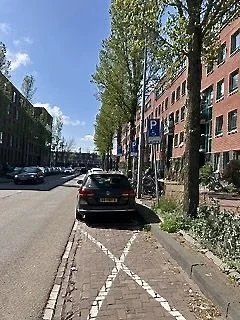On being refused a disabled parking space
When I first moved to Amsterdam from London more than twenty years ago, some friends told me that although they had a residents’ parking permit, they tried to use their car as little as possible because of the difficulty in finding one when they came home. I remember thinking that was crazy. Maybe it was because they lived near the centre and for us further away it was different.
For several years it was but no longer. Over time more and more parking places have been separated off for electric cars, car hire companies, lorry parking and disabled parking places. From my balcony I can count nine places allocated to disabled parking and there are several more in the street outside of my line of vision. It’s not at all unusual if my partner and I return home in the evening to find everything is full. That means that I need to be dropped off at home and my partner, who is the driver, sets off to find a place. The record for the longest time spent looking for a spot is 45 minutes! It feels as if no-one is looking at neighbourhoods and assessing how difficult it is to park, or even if there are sufficient residential places for those who have paid for them.
Since I started walking with sticks and my whole mobility story became more intense, I have taken a keen interest in the number of disabled parking spaces exploding in our neighbourhood. We talked about applying for one but felt reluctant to define me as someone who needed one and not to add to the burden on parking. It was our neighbours who urged us to try for one, convincing us that it was make life a lot easier. They told us that once you have a spot it is valid all over the Netherlands, as well as all over the EU. My partner and I got excited about the prospect of going into town more often and of travelling becoming easier. Now my energy for walking is less, the harder a journey is the less I can do when I arrive at my destination.
We gathered our courage and applied.
You get to talk to a doctor who is meant to assess you. The one we saw was young and friendly and seemed sympathetic. She observed me walking and listened to my story. Looking back, it’s obvious that we played it all wrong. My whole story with my mobility is to try and work with it, to maximise what I can do and to work hard at not feeling sorry for myself. So, I tried to explain the beneficial affect this permit would have on my life. I don’t think it was what she wanted to hear. It turns out that an important criterion is that you are unable to be left standing on the street by yourself—something that was not clear in the directions on the website. My passionate accounts of wanting to be as mobile as I can for as long as possible and so retain some independence fell on deaf ears.
We were turned down. We appealed and were turned down again.
I was left with the impression that I should have exaggerated my difficulties with walking and complained a lot. I should have appeared helpless and not able to manage—all the things that I am struggling to transform, or not give into. The doctor who assessed me freely admitted that the system is being abused—something I have wondered about for a while. My secret belief is that if a family have an older woman—a wife, a mother, grandmother—they apply for a parking permit on her behalf and then the whole family makes free with the parking concession. I have observed several instances that look like this in our neighbourhood.
It would be great to laugh at the whole thing—perhaps I will in time. Right now, it feels an unfair indifference to my needs, just as I am trying to come to terms with having them! It’s horrible to be sizing up people in your street and wondering how they qualified for a place when you didn’t—much better to just give them the benefit of the doubt. It’s always exhilarating to get one over on the establishment and maybe it helps these families more than I know.
I’ve been asking myself why I am sharing this story. The answer that comes is that this was first experience of owning my mobility issues in a structural way. It’s different offering yourself as a person with needs to an official body than it is to talk with your consultant. The experience has stirred up new feelings in me which still need to be processed. I am learning that each step of the restricted-mobility journey comes with seeing parts of yourself that you have not yet owned and maybe risks pain and lack of support. Coming to terms with all this seems an essential part of knowing to live in this new way.
There is one bright spot for me in all this. Our neighbours, who started us on this whole process, were horrified by the decision not to allocate us a space. Unbeknown to us, they called the department and complained, saying it was unfair and unjust. Because of their intervention there is a slender hope that something will work out for us but for me, their concern and willingness to stick their neck out on my behalf helps more than I can say. At the end of the day, someone did recognise my need and that is oddly comforting.

